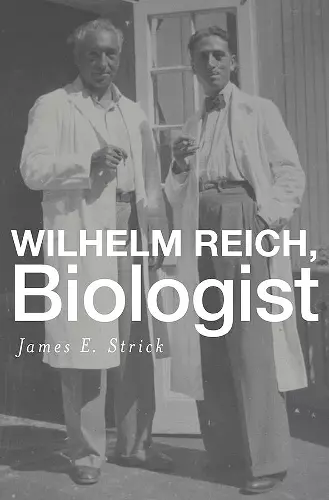Wilhelm Reich, Biologist
Format:Hardback
Publisher:Harvard University Press
Published:30th Apr '15
Currently unavailable, and unfortunately no date known when it will be back

Psychoanalyst, political theorist, pioneer of body therapies, prophet of the sexual revolution—all fitting titles, but Wilhelm Reich has never been recognized as a serious laboratory scientist, despite his experimentation with bioelectricity and unicellular organisms. Wilhelm Reich, Biologist is an eye-opening reappraisal of one of twentieth-century science’s most controversial figures—perhaps the only writer whose scientific works were burned by both the Nazis and the U.S. government. Refuting allegations of “pseudoscience” that have long dogged Reich’s research, James Strick argues that Reich’s lab experiments in the mid-1930s represented the cutting edge of light microscopy and time-lapse micro-cinematography and deserve to be taken seriously as legitimate scientific contributions.
Trained in medicine and a student of Sigmund Freud, Reich took to the laboratory to determine if Freud’s concept of libido was quantitatively measurable. His electrophysiological experiments led to his “discovery” of microscopic vesicles (he called them “bions”), which Reich hypothesized were instrumental in originating life from nonliving matter. Studying Reich’s laboratory notes from recently opened archives, Strick presents a detailed account of the bion experiments, tracing how Reich eventually concluded he had discovered an unknown type of biological radiation he called “orgone.” The bion experiments were foundational to Reich’s theory of cancer and later investigations of orgone energy.
Reich’s experimental findings and interpretations were considered discredited, but not because of shoddy lab technique, as has often been claimed. Scientific opposition to Reich’s experiments, Strick contends, grew out of resistance to his unorthodox sexual theories and his Marxist political leanings.
Presents Reich above all as a scientist, a gifted researcher and a serious biologist… Strick’s learned and thoroughly researched book contributes enormously not just to an understanding of Wilhelm Reich, but to the broader milieu of European biological science in the 1920s and ’30s. -- Paul Lerner * Times Literary Supplement *
Strick’s goal is to provide an historical analysis of the development of some of Reich’s controversial biological ideas and to establish that they had real scientific merit in their day, and perhaps even for contemporary researchers. It is great to read a book that looks beneath the dramatic life story to explore Reich’s actual science… Strick has not only produced a wonderful portrayal of Reich as a laboratory scientist, but he has also provided historians with a significant case study of interwar European biomedical holism and the eclipse of these research programs by a molecular biology that reintroduced physical-chemical reductionism as the dominant paradigm in the life sciences… Strick points out, however, that the bion experiments are perfectly comprehensible (indeed, state-of-the-art) when understood in the context from which they emerged. More importantly, they have something meaningful to offer the life sciences of today. -- Jennifer van der Grinten * Journal of the History of the Behavioral Sciences *
Wilhelm Reich, Biologist portrays a fascinating, unexpected episode of the interwar life sciences, and provocatively calls for a reappraisal of Reich’s laboratory work on the basis of novel archival insight. -- Mathias Grote, Lecturer, Humboldt-Universität zu Berlin
Wilhelm Reich, Biologist is a bold and well-researched book, with refreshingly new perspectives on a famous and controversial scientist who continues to fascinate new audiences as a remarkable personality in the history of science. -- Håvard Friis Nilsen, historian of psychoanalysis
- Nominated for Dingle Prize 2017
ISBN: 9780674736092
Dimensions: unknown
Weight: unknown
480 pages